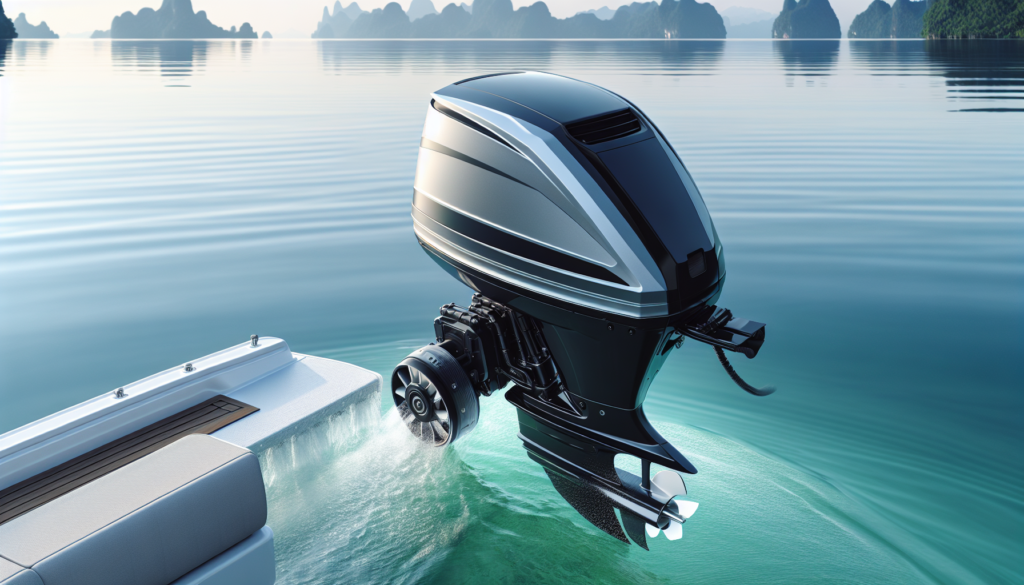Imagine gently gliding over the water in your boat, the only sounds being the lapping of waves against the hull and the call of seabirds overhead. Now, picture this serene scene being powered by an electric outboard motor. In this article, “The Benefits Of Electric Outboard Motors For Conservation-Minded Boaters,” we’re going to discuss how switching to an electric motor can not only enhance your boating experience but also contribute substantially to environment conservation. You’ll discover why many savvy boaters are opting for this greener, quieter, and more energy-efficient alternative, and by the end, you might find yourself rethinking your own boating choices.

Understanding Electric Outboard Motors
In this era of technology and sustainability, electric outboard motors have been making a name for themselves due to their numerous advantages over traditional gas engines. But what exactly are these motors and how do they work?
Definition of Electric Outboard Motors
So, what is an electric outboard motor? Simply put, it’s a propulsive device that’s powered by electricity rather than gasoline. It’s installed on the aft (rear) side of a boat to provide propulsion. This kind of motor is perfect for boating aficionados who are environmental conscious as it combines functionality with sustainability.
How Electric Outboard Motors Work
The operations of electric outboard motors can be summed up in few essential steps. First off, the battery supplies the electrical power. This power goes to the controller that adjusts the speed and direction. The controller then sends this adjusted power to the motor, which finally transforms it into mechanical energy to propel the boat.
Different Types of Electric Outboard Motors
Electric outboard motors come in various forms, with the most common ones being the brushless and brushed motors. Brushless motors are more efficient as they generate less heat and require less maintenance. However, they’re relatively expensive. Brushed motors, on the other hand, are cheaper but wear out faster and require more maintenance.
Environmental Impact of Electric Outboard Motors
One of the most compelling reasons to opt for electric motors is their positive impact on the environment. Let’s dive into these benefits.
Reduced Gas Emissions
electric outboard motors don’t emit harmful greenhouse gases like carbon dioxide, which means they’re playing a pivot role in reducing air pollution. By using these motors, you’re doing your part to fight climate change while enjoying your boating experience.
No Oil Spills and Leaks
Unlike their traditional counterparts, electric motors don’t use oil or gasoline, which means they don’t pose the risk of oil spills or leaks. This crucial factor helps protect aquatic life and preserve the water quality.
Noise Pollution Reduction
Another great advantage of electric outboard motors is their quiet operation. They don’t produce the loud, disruptive noise often associated with gas motors. Thus, contributing to a reduction in noise pollution.
Contribution to Water Clarity
Because they don’t leak oil or discharge exhaust fumes into the water, electric outboard motors contribute significantly to maintaining the clarity and health of the water bodies they operate in.

Efficiency and Performance of Electric Outboard Motors
Aside from their environmental benefits, electric outboard motors also offer remarkable efficiency and performance.
Consistent and Instant Torque
One clear advantage of electric motors is their instant torque. They can attain maximum torque from a standing start, providing an immediate acceleration. This ensures consistent power delivery which is essential for smooth and swift boating.
Low Maintenance
Since they contain fewer moving parts and don’t require oil, electric outboard motors are considerably easier and cheaper to maintain than traditional gas engines.
Reduced Fuel Costs
Electric outboard motors run on electricity, and thus don’t demand expensive fuel. Not only does this significantly reduce cost but also it saves you from the hassles of refuelling.
Longer Lifespan
Electric motors generally have a longer lifespan than gasoline-powered engines, mainly due to their simpler design and lower rates of wear and tear.
Innovation in Electric Outboard Motors
In recent years, there has been a surge in innovative designs and technologies in the electric outboard motor industry.
Innovative Design Features
Modern electric outboard motors come with advanced design features like digital throttle controls, advanced cooling systems, and power management technology that make them more user-friendly, efficient, and robust than ever before.
Advancements in Battery Technology
Much of the recent progress in electric outboard motors could be attributed to advancements in battery technology. Batteries are becoming lighter, more durable, and faster to recharge, improving both the range and ease of use of electric motors.
Future Predictions for Electric Outboard Motor Technologies
Considering the pace of innovation, it’s reasonable to anticipate even more efficient-performance electric motors in the near future. This might include motors with longer battery life, quicker charging times, and even advanced features like solar charging capabilities.

Comparisons between Electric and Gas Outboard Motors
Once you’re aware of what electric outboard motors bring to the table, it’s worth taking a look at how they compare to their gas counterparts.
Emission Rates
The most noticeable difference is in the emission rates. While gas motors release harmful greenhouse gases, electric motors produce zero emissions, marking a clear advantage for environmental conservation.
Performance and Power
Traditionally, gas motors have been viewed as more powerful. However, electric motors are quickly catching up, offering just as much power and much smoother performance.
Cost Comparisons
While the initial price of an electric outboard motor may be higher, the operational costs are much lower. Not only do they save on fuel costs, but their maintenance is also less costly, making them a worthwhile investment over time.
Maintenance and Repair
With fewer moving parts and no need for oil or fuel, electric outboard motors require notably less maintenance and repair than gas motors.
Safety Features of Electric Outboard Motors
In addition to their environmental and efficiency benefits, electric outboard motors also come equipped with numerous safety features.
No Carbon Monoxide Emissions
Since they run on electricity, these motors do not emit carbon monoxide – a dangerous gas that’s often released by gas engines, improving the safety for users.
Lower Fire Risk
Due to the absence of combustible fuels like gasoline, electric outboard motors present a much lower risk of causing fires when compared to gas motors.
Safety Measures in Manufacturing
Many electric outboard motors are designed and manufactured with added safety measures, such as waterproof casings for batteries and motor parts, ensuring better user safety.

Government Regulations and Incentives for Electric Outboard Motors
Given their benefits, many governments worldwide are encouraging the use of electric outboard motors via various policies and incentives.
Government Policies on Emissions
In response to increasing concerns over climate change, many governments are implementing emission standards that favour electric motors over gas motors.
Financial Incentives for Electric Motors
There are also monetary incentives, such as tax credits and rebates, offered in many countries to encourage consumers to switch to electric outboard motors.
Global Regulations and Standards
There are numerous global guidelines and standards in place promoting the development and use of cleaner and more energy-efficient outboard motors.
Challenges of Using Electric Outboard Motors
While the advantages of electric motors are clear, it’s worth addressing some of their challenges.
Initial Investment Costs
Upfront costs for electric motors can be higher than for conventional outboard motors, which may be a hurdle for potential buyers.
Charging Infrastructure
The availability of charging infrastructure can be a limitation, especially in remote areas or older marinas.
Range Limitations
Although battery technology is rapidly improving, range can be an issue, particularly for boaters planning to travel long distances.
Case Studies: Adoption of Electric Outboard Motors
Electric outboard motors are increasingly being adopted by various segments, from individual boat owners to commercial operators.
Individual Boater Experiences
Many personal boat owners have shared positive experiences with electric motors, citing their quiet operation, easy maintenance, and the benefits of not having to deal with oil and gas.
Professional / Commercial Use Cases
On the commercial front, electric outboard motors are being adopted by tour operators, rental services, and public agencies, among others.
Regional Adoption Rates and Trends
In regions where regulations and incentives promote electric motor use, adoption rates are high and continue to rise.
Guidelines for Switching to Electric Outboard Motors
If you’re considering making the switch to an electric outboard motor, here are some guidelines to follow:
Assessing Individual Needs
Before making a purchasing decision, it’s important to consider your needs, such as the size of your boat and your typical boating habits.
Understanding the Costs Involved
It’s also crucial to understand the costs involved, not just the purchase price but also the cost of battery charging and any potential upgrade to your boat’s electrical infrastructure.
Selection Tips for Appropriate Models
Make sure you select a motor that’s suitable for your boat in terms of power and weight. Many manufacturers offer guidelines to help you choose.
Maintenance Tips for Electric Motors
Proper care and maintenance can extend the life of your electric motor and ensure its optimal performance. This includes regular cleaning and avoiding overloading the motor.
In conclusion, electric outboard motors offer several compelling benefits, from environmental sustainability to increased efficiency and safety. It’s essential to understand these benefits, alongside any potential challenges, to make an informed decision about switching to an electric outboard motor.


[…] the booming sector of electric cars, electric boat motors have come a long way. They’re quiet, require less maintenance, and produce zero emissions. […]